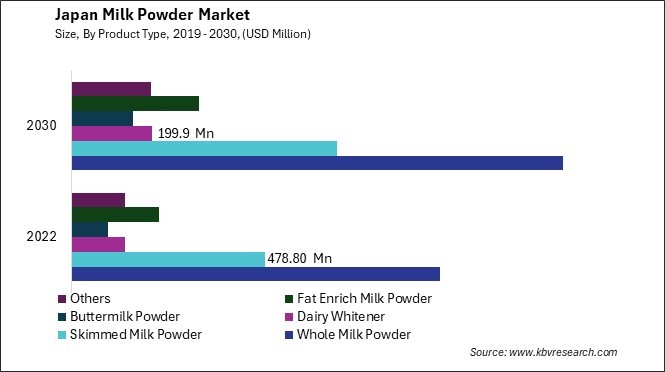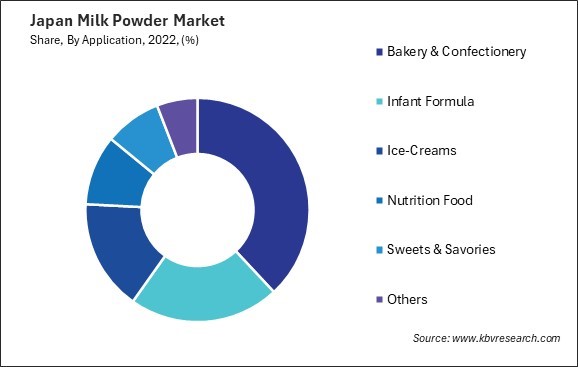Int'l : +1(646) 832-2886 | query@kbvresearch.com
Int'l : +1(646) 832-2886 | query@kbvresearch.com
Published Date : 20-May-2024 |
Pages: 78 |
Formats: PDF |
The Japan Milk Powder Market size is expected to reach $2.7 Billion by 2030, rising at a market growth of 4.3% CAGR during the forecast period. In the year 2022, the market attained a volume of 596.9 Kilo Tonnes, experiencing a growth of 4.8% (2019-2022).
The milk powder market in Japan has witnessed significant growth and evolution over the years, driven by various factors such as changing consumer preferences, dietary habits, and lifestyle choices. The nutritional benefits associated with milk powder contribute to its popularity among health-conscious Japanese consumers. Moreover, the growing awareness of lactose intolerance and dairy allergies has led to the increased adoption of milk alternatives, including powdered milk derived from soy, almonds, or oats, catering to diverse dietary needs and preferences.

As disposable incomes rise and lifestyles become more hectic, Japanese consumers increasingly turn to convenient and affordable food options, driving the demand for packaged and processed foods, including milk powder. Moreover, the rapid pace of urbanization has led to changes in consumption patterns, with more people living in smaller households and seeking convenient, ready-to-use food products.
The COVID-19 pandemic has had a significant impact on the milk powder market in Japan, as it has on the global food industry. The outbreak led to disruptions in the supply chain, logistical challenges, and changes in consumer behavior. With lockdowns, social distancing measures, and health concerns affecting traditional shopping patterns, there was a noticeable shift towards online and e-commerce channels for purchasing essential goods, including milk powder.
Furthermore, the pandemic heightened health and hygiene awareness, leading to increased demand for packaged and shelf-stable products like milk powder. Japanese consumers sought products with longer shelf lives that can be stored safely at home, contributing to a surge in sales of milk powder during the peak of the crisis. However, the economic uncertainties and financial constraints resulting from the pandemic also impacted consumer spending habits, with some opting for more economical alternatives or reducing discretionary purchases.
The food processing industry in Japan has witnessed significant expansion in the milk powder market in recent years, driven by several key factors. One of the primary drivers of expanding the food processing industry in Japan's milk powder market is the growing consumer demand for convenient and shelf-stable dairy products. Milk powder offers advantages such as longer shelf life, easy storage, and convenience in preparation, making it an attractive option for Japanese consumers with busy lifestyles.
According to the U.S. Department of Agriculture, in 2021, Japan's food industry showcased significant economic prowess, with the combined sales from hotels, restaurants, and institutional food services reaching $231 billion (JP¥24,621 billion). Within this landscape, the food processing sector emerged as a pivotal player, contributing $216 billion in revenue. This industry is renowned for producing a wide array of food products, spanning traditional Japanese fare, Western delicacies, and specialized options catering to the needs of infants and the elderly.
Amidst this thriving food sector, notable attention is directed towards expanding the food processing industry, particularly in the lucrative milk powder market. As Japan continues to witness a surge in demand for milk powder products, including those catering to various dietary needs and age demographics, the food processing sector is poised for further growth and innovation. This expansion aligns with the broader trend observed in 2021, where the total value of retail food and beverage sales in Japan amounted to a substantial $467 billion.
Furthermore, there has been a notable shift in consumer preferences towards healthier and functional food products. Milk powder manufacturers in Japan have responded to this demand by fortifying their products with vitamins, minerals, and other nutrients, catering to health-conscious consumers. Additionally, the increasing popularity of dairy-based beverages, such as milk tea and flavored milk, has further fueled the growth of the milk powder market in the country. Thus, the expansion of Japan's milk powder market is driven by growing consumer demand for convenient, shelf-stable dairy products fortified with nutrients and fueled by the increasing popularity of dairy-based beverages.
Consumer demand for convenience products in the milk powder market in Japan has witnessed a notable rise in recent years. One key driver is the fast-paced lifestyle prevalent in Japanese society. With hectic work schedules and busy lifestyles, Japanese consumers increasingly seek convenience products without compromising quality or nutrition. The increasing popularity of powdered milk among parents with young children has bolstered demand in the milk powder market. Additionally, powdered milk often comes fortified with essential nutrients, making it a nutritious choice for growing children in Japan.
In response to this growing demand, manufacturers in the milk powder market in Japan are innovating to introduce more convenient packaging formats and product variations. Ready-to-drink milk powder sachets, single-serve portions, and resealable containers are some examples of products designed to cater to the evolving needs of Japanese consumers seeking convenience.
Moreover, the growing trend of single-person households in Japan has also contributed to the demand for convenience products. As more people opt for independent living arrangements, there is a greater emphasis on convenience and ease of use in household products. Therefore, the rising demand for convenience products in the milk powder market in Japan reflects a societal shift towards prioritizing ease and quality in fast-paced lifestyles and changing household structures.

In Japan, the milk powder market is a significant component of the dairy industry, catering to various consumer needs and preferences. With a rich cultural heritage and modern innovation, Japan's milk powder market reflects a blend of tradition and advancement. Several companies play pivotal roles in shaping this industry, meeting the diverse demands of consumers across different segments. One prominent player in the Japanese milk powder market is Meiji Holdings Co., Ltd. Founded in 1917, Meiji has established itself as a trusted brand synonymous with quality and reliability. The company offers a wide range of milk powder products tailored to meet the nutritional requirements of infants, children, and adults. Its commitment to research and development ensures the continuous improvement of product offerings, incorporating the latest scientific findings to enhance health benefits.
Lion Corporation, a diversified consumer goods company, is also a significant player in the Japanese milk powder market. Leveraging its expertise in research and development, Lion Corporation offers innovative milk powder products that cater to specific consumer needs, such as lactose-free or fortified with vitamins and minerals. The company's strong distribution network ensures the widespread availability of its products across Japan, reaching consumers in urban centers and rural areas alike.
Another key player is Morinaga Milk Industry Co., Ltd., a company with a long history dating back to 1917. Morinaga's milk powder products are renowned for their high-quality ingredients and nutritional value. The company strongly emphasizes consumer feedback, continually refining its formulations to align with changing preferences and dietary trends. Morinaga's dedication to sustainability and ethical sourcing also resonates with environmentally-conscious consumers in Japan.
Kewpie Corporation, known for its iconic Kewpie brand, has a presence in the Japanese milk powder market, focusing on infant nutrition. With a legacy spanning over a century, Kewpie has earned the trust of Japanese consumers as a provider of safe and wholesome food products. Its infant formula milk powders are carefully formulated to support healthy growth and development, backed by extensive research and stringent quality control measures.
Furthermore, companies like Megmilk Snow Brand Co., Ltd. and Yakult Honsha Co., Ltd. also contribute significantly to the diversity of offerings in the Japanese milk powder market. Megmilk Snow Brand's long-standing heritage and commitment to freshness resonate with consumers seeking premium dairy products. Yakult Honsha, renowned for its probiotic beverages, diversifies into the milk powder segment, offering innovative products that promote digestive health and overall well-being. Thus, the milk powder market in Japan is characterized by a diverse array of companies offering innovative products tailored to meet the evolving needs and preferences of consumers.
By Product Type
By Application